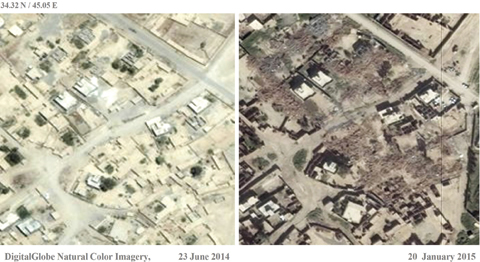 This satellite combo image taken on June 23, 2014 (left) and Jan 20, 2015 (right) shows the Iraqi village of Jumeili before and after its destruction by Kurdish forces. —AP
This satellite combo image taken on June 23, 2014 (left) and Jan 20, 2015 (right) shows the Iraqi village of Jumeili before and after its destruction by Kurdish forces. —APBAGHDAD: Western-backed Kurdish forces fighting jihadists in Iraq have destroyed thousands of homes in an apparent bid to uproot Arab communities that may constitute war crimes, Amnesty International said yesterday. The rights watchdog said the destruction took place in areas of northern Iraq recaptured from the Islamic State group, which overran swathes of the country in 2014. The United States has carried out air strikes in support of forces from Iraq's autonomous Kurdish region since August 2014 and other countries have also backed them with air support, training and weapons.
Kurdish forces "appear to be spearheading a concerted campaign to forcibly displace Arab communities," Amnesty's Donatella Rovera said in a statement. "The forced displacement of civilians and the deliberate destruction of homes and property without military justification may amount to war crimes," she added. Destruction of homes and property theft have occurred frequently during the war against IS, angering residents whose support security forces need to hold recaptured areas, and sowing the seeds of future conflict.
"Peshmerga forces from the Kurdistan Regional Government (KRG) and Kurdish militias in northern Iraq have bulldozed, blown up and burned down thousands of homes in an apparent effort to uproot communities in revenge for their perceived support" of IS, Amnesty said. The rights group carried out a field investigation and interviewed witnesses. Satellite images also provided evidence of "widespread destruction", it said. Arab civilians who fled fighting have also been barred from returning home.
Kurdish Denial
Dindar Zebari, a KRG official, blamed combat for the destruction. "Many houses were destroyed because of clashes between peshmerga forces and Daesh members in villages located in war zones," Zebari said, using an Arabic acronym for IS. "Bombing by the international coalition also caused the destruction of houses, and Daesh members rigged houses in the villages to blow up the peshmerga forces," he said. He also accused residents of affected areas of working with IS. "On the arrival of Daesh members to these areas, a number of tribal leaders cooperated with Daesh and these villages became a source for terrorists."
"They stole the belongings of the citizens in these areas and killed many young Yazidis," committing genocide and crimes against humanity against them, he said, referring to IS's campaign of mass killings, kidnappings and rapes targeting the minority group. Amnesty documented evidence of "forced displacement and large-scale destruction of homes" by Kurdish forces in three provinces: Nineveh, Kirkuk and Diyala.
Violations in Syria
The London-based rights watchdog published a similar report about Kurdish forces in neighbouring Syria in October, accusing them of war crimes. It said those forces had deliberately demolished civilian homes and forcibly displaced inhabitants "with no justifiable military grounds". Although the Kurdish People's Protection Units (YPG) pushed back against the allegations at the time, it said on Tuesday that it would prosecute four of its fighters accused of damaging property in a town recaptured from IS several months ago.
Syrian Kurdish forces have also received air support and other backing from the US-led coalition. In Iraq, IS was driving Kurdish forces back toward their regional capital Arbil in August 2014 when the US began carrying out air strikes against the jihadists, playing a key role in stopping their advance and later helping the Kurds regain ground. All three provinces where Amnesty said destruction of property took place are outside the borders of the autonomous Kurdistan region.
But Kurdish forces gained or solidified control over areas in the provinces after federal troops fled IS's devastatingly effective offensive in June 2014. Iraqi Kurdish leaders want to incorporate territory from the provinces into their autonomous region, and depopulating them of Arabs aids efforts to maintain Kurdish control. Baghdad strongly opposes Iraqi Kurdistan's incorporation of the areas, which it wants to remain under federal control, but after fighting IS for the territory the Kurds are even more committed to keeping them. - AFP









